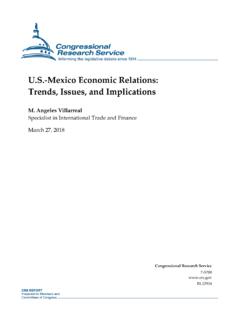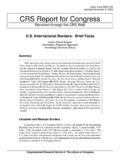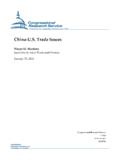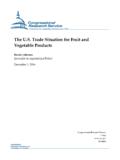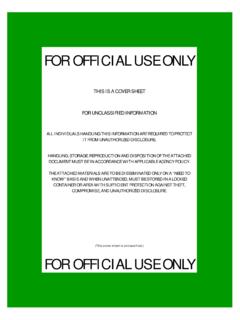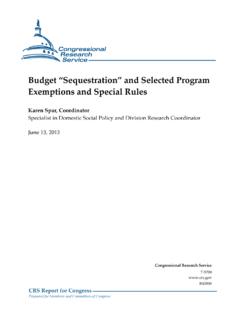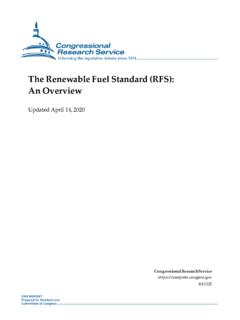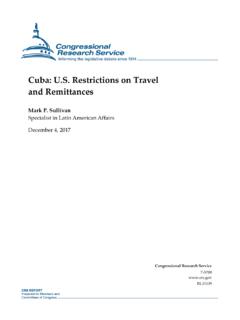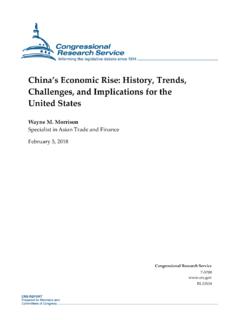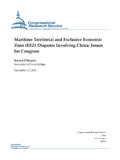Transcription of Tax Havens: International Tax Avoidance and Evasion
1 Tax Havens: International Tax Avoidance and Evasion Jane G. Gravelle Senior Specialist in Economic Policy January 15, 2015 Congressional Research Service 7-5700 R40623 Tax Havens: International Tax Avoidance and Evasion Congressional Research Service Summary Addressing tax Evasion and Avoidance through use of tax havens has been the subject of a number of proposals in Congress and by the President. Actions by the Organization for Economic Cooperation and Development (OECD) and the G-20 industrialized nations also have addressed this issue. In the 111th Congress, the HIRE Act ( 111-147) included several anti- Evasion provisions, and 111-226 included foreign tax credit provisions directed at perceived abuses by multinationals. Numerous legislative proposals to address both individual tax Evasion and corporate tax Avoidance have been advanced.
2 Multinational firms can artificially shift profits from high-tax to low-tax jurisdictions using a variety of techniques, such as shifting debt to high-tax jurisdictions. Because tax on the income of foreign subsidiaries (except for certain passive income) is deferred until income is repatriated (paid to the parent as a dividend), this income can avoid current taxes, perhaps indefinitely. The taxation of passive income (called Subpart F income) has been reduced, perhaps significantly, through the use of hybrid entities that are treated differently in different jurisdictions. The use of hybrid entities was greatly expanded by a new regulation (termed check-the-box) introduced in the late 1990s that had unintended consequences for foreign firms. In addition, earnings from income that is taxed often can be shielded by foreign tax credits on other income.
3 On average, very little tax is paid on the foreign source income of firms. Ample evidence of a significant amount of profit shifting exists, but the revenue cost estimates vary substantially. Evidence also indicates a significant increase in corporate profit shifting over the past several years. Recent estimates suggest losses that may approach, or even exceed, $100 billion per year. Individuals can evade taxes on passive income, such as interest, dividends, and capital gains, by not reporting income earned abroad. In addition, because interest paid to foreign recipients is not taxed, individuals can evade taxes on source income by setting up shell corporations and trusts in foreign haven countries to channel funds into foreign jurisdictions. There is no general third-party reporting of income as is the case for ordinary passive income earned domestically; the Internal Revenue Service (IRS) relies on qualified intermediaries (QIs).
4 In the past, these institutions certified nationality without revealing the beneficial owners. Estimates of the cost of individual Evasion have ranged from $40 billion to $70 billion. The Foreign Account Tax Compliance Act (FATCA; included in the HIRE Act, 111-147) introduced required information reporting by foreign financial intermediaries and withholding of tax if information is not provided. These provisions became effective only recently, and their consequences are not yet known. Most provisions to address profit shifting by multinational firms would involve changing the tax law: repealing or limiting deferral, limiting the ability of the foreign tax credit to offset income, addressing check-the-box, or even formula apportionment. President Obama s proposals include a proposal to disallow overall deductions and foreign tax credits for deferred income, along with a number of other restrictions.
5 Changes in the law or anti-abuse provisions have also been introduced in broader tax reform proposals. Provisions to address individual Evasion include increased information reporting and provisions to increase enforcement, such as shifting the burden of proof to the taxpayer, increased penalties, and increased resources. Individual tax Evasion is the main target of the HIRE Act, the proposed Stop Tax Haven Abuse Act, and some other proposals. Tax Havens: International Tax Avoidance and Evasion Congressional Research Service Contents Introduction .. 1 Where Are the Tax Havens? .. 3 Formal Lists of Tax Havens .. 3 Developments in the OECD Tax Haven List .. 5 Other Jurisdictions with Tax Haven Characteristics .. 7 Methods of Corporate Tax Avoidance .. 9 Allocation of Debt and Earnings Stripping .. 10 Transfer Pricing.
6 12 Contract Manufacturing .. 13 Check-the-Box, Hybrid Entities, and Hybrid Instruments .. 14 Cross Crediting and Sourcing Rules for Foreign Tax Credits .. 15 The Magnitude of Corporate Profit Shifting .. 16 Evidence on the Scope of Profit Shifting .. 16 Estimates of the Cost and Sources of Corporate Tax Avoidance .. 19 Importance of Different Profit Shifting Techniques .. 22 Methods of Avoidance and Evasion by Individuals .. 24 Tax Provisions Affecting the Treatment of Income by Individuals .. 25 Limited Information Reporting Between Jurisdictions .. 26 Collection of Information on Income and Qualified Intermediaries .. 26 European Union Savings Directive .. 27 Estimates of the Revenue Cost of Individual Tax Evasion .. 27 Alternative Policy Options to Address Corporate Profit Shifting .. 28 Broad Changes to International Tax Rules.
7 28 Repeal Deferral .. 28 Targeted or Partial Elimination of Deferral .. 29 Allocation of Deductions and Credits with Respect to Deferred Income/Restrictions on Cross Crediting .. 30 Formula Apportionment .. 31 Narrower Provisions Affecting Multinational Profit Shifting .. 32 Eliminate Check-the-Box, Hybrid Entities, and Hybrid Instruments .. 32 Tighten Earnings Stripping Rules; Limit Interest Deductions .. 32 Foreign Tax Credits: Source Royalties as Domestic Income for Purposes of the Foreign Tax Credit Limit or Create Separate Basket; Eliminate Title Passage Rule; Restrict Credits for Taxes Producing an Economic Benefit .. 33 Transfer Pricing .. 33 Other Provisions .. 34 Options to Address Individual Evasion .. 34 Information Reporting .. 34 Multilateral Information Sharing or Withholding; International Cooperation.
8 34 Expanding Bilateral Information Exchange .. 35 Unilateral Approaches: Withholding/Refund Approach; Increased Information Reporting 35 Other Measures That Might Improve Compliance .. 35 Incentives/Sanctions for Tax Havens .. 35 Tax Havens: International Tax Avoidance and Evasion Congressional Research Service Revise and Strengthen the Qualified Intermediary Program .. 36 Place the Burden of Proof on the Taxpayer .. 36 Treat Shell Corporations as Firms .. 36 Extend the Statute of Limitations .. 36 Greater Resources for the Internal Revenue Service to Focus on Offshore .. 37 Make Civil Cases Public as a Deterrent .. 37 John Doe Summons .. 37 Strengthening of Penalties .. 37 Address Tax Shelters .. 38 Regulate the Rules Used by States to Permit Incorporation .. 38 Make Suspicious Activity Reports Available to Civil Side of 38 Summary of Enacted Legislation in 2011.
9 38 The Hiring Incentives to Restore Employment (HIRE) Act ( 111-147): FATCA .. 38 Reporting on Foreign Accounts .. 39 Deduction of Interest for Bearer (Nonregistered) Bonds .. 39 Additional Information Reported on Tax Returns .. 39 Penalties .. 39 Statute of Limitations .. 39 Reporting on Foreign passive Investment Companies .. 39 Electronic Filing .. 40 Trusts .. 40 Treat Equity Swaps as Dividends .. 40 Economic Substance Doctrine: The Patient Protection and Affordable Care Act, 111-148.. 40 111-226 .. 40 Preventing Splitting Foreign Tax Credits from Income .. 41 Denial of Foreign Tax credits for Covered Asset Acquisitions .. 41 Separate Foreign Tax Credit Limit for Items Resourced Under Treaties .. 42 Limitation on the Use of Section 956 (the Hopscotch Rule) .. 42 Special Rule for Certain Redemptions by Foreign Subsidiaries.
10 42 Modification of Affiliation Rules for Allocating Interest Expense .. 43 Repeal of 80/20 Rules .. 43 Technical Correction to the HIRE Act .. 43 Summary of Legislative Proposals .. 44 American Jobs and Closing Loopholes Act ( 4213, 111th Congress) .. 44 Source Rules on Guarantees .. 44 Boot-Within-Gain Revisions .. 44 President Obama s International Tax Proposals .. 45 Provisions Affecting Multinational Corporations and Other Tax Law Changes .. 45 Provisions Relating to Individual Tax Evasion , Not Enacted in the HIRE Act .. 49 The Wyden-Gregg and Wyden-Coats Tax Reform Bills .. 49 Chairman Camp s Territorial Tax Proposal (Included in 1, 113th Congress) and Senator Enzi s Bill (S. 2091, 112th Congress) .. 50 Stop Tax Haven Abuse Act .. 51 111th Congress (S. 506 and 1245) .. 51 112th Congress (S. 1346 and 2669).
